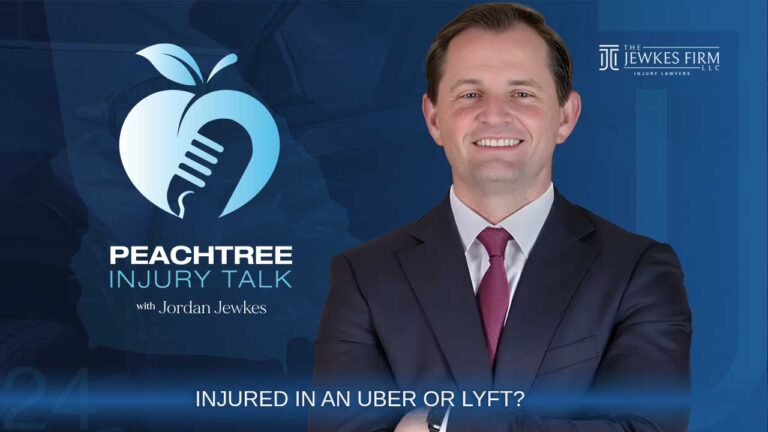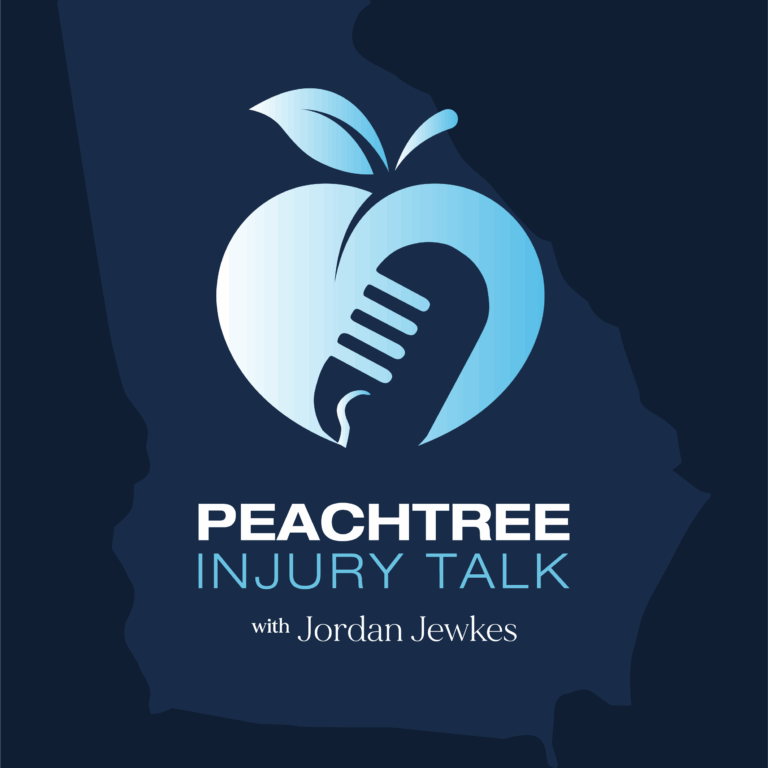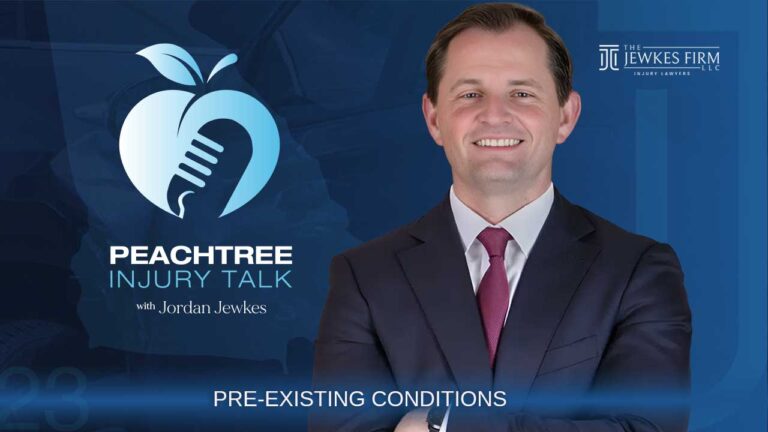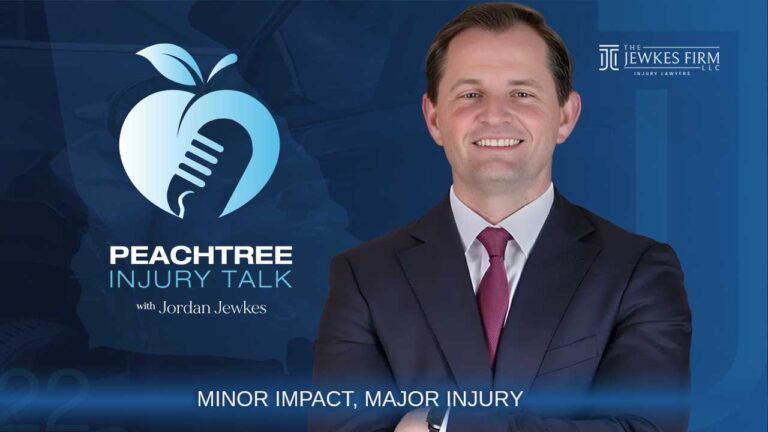
Injured in an Uber or Lyft? What Georgia Riders Should Know
In this episode of Peachtree Injury Talk, attorney Jordan Jewkes discusses the legal complexities surrounding accidents involving rideshare services like Uber and Lyft. He explains
Home | Podcasts | Peachtree Injury Talk | Protecting Your Kids — What Parents Need to Know After a Child Is Injured in an Accident
Peachtree Injury Talk with Jordan Jewkes
In this episode of Peachtree Injury Talk, attorney Jordan Jewkes discusses the legal considerations parents should know if their child is injured in an accident. As a former insurance defense lawyer now advocating for injury victims, Jordan explains that the law treats minors differently than adults, particularly regarding statutes of limitations. While parents have two years to file claims for medical expenses, a child’s personal injury claim can typically be filed up to two years after they turn 18. Children can recover damages for pain, suffering, and future impacts, often resulting in higher compensation due to lifelong effects.
Jordan also highlights safeguards for settlements exceeding $25,000 to protect the funds until the child reaches adulthood. He encourages parents to pursue claims even if the at-fault party is a family friend, emphasizing the importance of thorough assessments for long-term injuries and consulting specialists before settling. Finally, Jordan reassures parents hesitant to pursue legal action to at least seek legal advice, underscoring their duty to protect their child’s interests and ensure justice.
| 00:00 | Narrator: Welcome to Peachtree Injury Talk with attorney Jordan Jewkes. |
| 00:05 | Evan Mack: Welcome back to Peachtree Injury Talk with Jordan Jewkes. Jordan is dedicated to giving injured victims a voice and providing strong advocacy against an often broken system. As a seasoned trial lawyer and former insurance defense attorney, he now uses his insider knowledge to fight for injury victims across Georgia. I'm Evan Mack, and today we're discussing something every parent hopes to never face: What to do if your child is injured in an accident, and how the legal process works when minors are involved. Welcome back, Jordan. |
| 00:37 | Jordan Jewkes: Thanks for having me, Evan. It’s always a pleasure. |
| 00:43 | Evan Mack: This episode is about protecting your kids — what parents need to know after a child is injured in an accident. It’s a tough topic for parents to think or talk about, but it’s important to have this information. Jordan, if you can guide them through this, it’ll be very valuable. If a child is injured in a car crash or a fall on someone else’s property, how is that legally different from an adult getting hurt? |
| 01:17 | Jordan Jewkes: First off, we all hope it never happens. Parents should do everything possible to keep their kids safe — making sure they’re in car seats or seatbelts. As a parent of four myself, I constantly remind my kids about seatbelts. But even with all precautions, accidents happen and we can’t control other people’s actions. The law does treat injuries to children differently than injuries to adults. Under Georgia law, and in most states, anyone under 18 is considered a minor with limited legal capacity, even teenagers. Adults are anyone 18 or older. So when a minor is injured, the claim process is different. Most importantly, the time limits to bring a claim change. For adults, you have two years from the date of injury to file a claim — for pain and suffering, medical bills, lost wages, and so on. For minors, it’s different. Generally, for children under 17, the statute of limitations doesn’t start until they turn 18. That means they have until two years after their 18th birthday to bring a claim — often until they are 20. There are exceptions. For example, parents or guardians responsible for the child's medical bills must bring that claim within two years of the injury. To illustrate: if you, Evan, were injured and had $10,000 in medical bills, you need to file within two years or risk losing compensation. But if your 5-year-old son was injured and you paid $10,000 for medical bills, you need to file a claim for those bills within two years. However, the claim for the child’s pain and suffering or other damages would not need to be filed until two years after they turn 18. So essentially, there are two claims: one for parents to recover medical expenses within two years, and one for the child’s own injury claim that can wait until after they turn 18. |
| 05:52 | Evan Mack: That’s really useful to understand. Are there limits on the types of compensation children can receive? For example, for pain and suffering or emotional trauma? |
| 06:06 | Jordan Jewkes: The law treats children much the same as adults regarding compensation for bodily injuries and mental health consequences. They can recover damages for past, present, and future pain and suffering. In fact, claims involving children often have more value because they have many years ahead of them. An injury that affects a child’s ability to live a full life — whether physical or mental — can have a lifelong impact. For example, a child who dreams of being a pilot but suffers a nerve injury in the hand may not be able to pursue that career. The injury impacts not just their current abilities, but their future hopes, ambitions, and quality of life. That means the damages can be quite high. |
| 09:07 | Evan Mack: What happens to any money awarded to the child? Can parents access it, or is it held until the child turns 18? |
| 09:25 | Jordan Jewkes: Good question. The law aims to protect the child’s money so they can benefit from it fully. At the same time, the law guards against misuse, either intentional or accidental, by parents or guardians. In Georgia, if the settlement is under $25,000, parents generally can keep and manage the money without extra safeguards. But for amounts above $25,000, courts require safeguards like trusts or special accounts—sometimes an annuity—that restrict access but allow the money to grow and be paid to the child in planned amounts as they mature. This protects the child’s compensation and ensures parents cannot deplete the funds, even if well-intentioned. It’s important to involve an attorney and possibly a financial advisor to set up these protections correctly. |
| 13:02 | Evan Mack: What if the accident involves a family friend or relative? Can the child still file a claim without causing family conflict? |
| 13:11 | Jordan Jewkes: Technically, yes. It can be difficult, but injuries happen, even involving people we know. For example, a child might get bitten by a relative’s dog or injured on their property due to negligence. People who host others generally should have liability insurance, and that can cover injury claims. Even if the at-fault party is a friend or family member, a claim can and should be made to protect the child’s interests. Parents shouldn’t avoid legal action to preserve family harmony at the expense of their child’s future. And remember, the child can still bring their own claim after turning 18 if the parents didn’t act. |
| 15:24 | Evan Mack: How do you approach cases with potential long-term effects, like scarring, developmental delays, or psychological trauma? |
| 15:28 | Jordan Jewkes: You must be intentional and thorough. Some injuries, especially brain injuries or psychological trauma, aren’t immediately obvious and can be hard to diagnose. Kids often can’t explain how they feel or what’s wrong. Behavioral changes might be the only signs. It’s crucial to consult the right specialists—pediatric neurologists, dentists, psychologists—to get detailed assessments. Don’t rush settlements before understanding the long-term consequences. Sometimes an economist is needed to calculate future medical costs and care. Serious injuries to children can have lifetime impacts, including millions in future expenses. So you want to protect those claims adequately. |
| 17:55 | Evan Mack: Finally, what advice do you have for parents afraid to pursue legal action? |
| 18:00 | Jordan Jewkes: I understand the hesitation. Most people don’t want to get involved in lawsuits. But as parents, we have a duty to protect our children’s interests. At least talk to an attorney to understand your options. Most times, no lawsuit is actually filed, and cases are resolved without trial. Even just knowing you’ve explored your options can give peace of mind. Your child deserves justice and protection — and you owe it to them to advocate on their behalf. |
| 19:19 | Evan Mack: Jordan, thank you so much for sharing this vital information. |
| 19:22 | Jordan Jewkes: Thanks, Evan. Always a pleasure. |
| 19:27 | Evan Mack: To learn more or connect with Jordan and his team, visit Jewkes@firm.com. Don’t forget to like, subscribe, and leave a review if you found this helpful. Thanks for watching Peachtree Injury Talk! |
| 19:42 | Narrator: Thanks for watching. Be sure to hit that like and subscribe button and leave us a review in the comments. |

Peachtree Injury Talk is a podcast by Kevin Rosenquist featuring legal insights and practical advice from Georgia-based attorney Jordan Jewkes. The show focuses on personal injury law, offering listeners expert guidance on navigating insurance claims, understanding legal processes, and protecting their rights after an accident. Each episode dives into real-life case examples, common challenges injured individuals face, and actionable tips for dealing with insurance companies and legal hurdles.
Episode Summary
In this episode of Peachtree Injury Talk, attorney Jordan Jewkes discusses the legal complexities surrounding accidents involving rideshare services like Uber and Lyft. He explains that liability typically depends on who is at fault and that rideshare companies provide substantial insurance coverage—usually around $1 million—when their drivers are operating with the app active. Jordan emphasizes the importance of immediately calling 911, seeking medical care, documenting the accident scene, and avoiding private settlements with drivers. He also highlights challenges in suing Uber or Lyft directly due to the independent contractor status of drivers and the prevalence of mandatory arbitration clauses. For passengers, drivers, or pedestrians involved in rideshare accidents, Jordan advises caution and thorough documentation to ensure proper insurance claims and compensation.
Timestamps
00:00 – Introduction to Peachtree Injury Talk
00:10 – Overview: Ride Share Accident Liability
00:39 – Determining Legal Responsibility and Insurance Liability
01:49 – Insurance Coverage for Passengers in Georgia
02:47 – Filing Claims and Insurance Layers for Ride Share Accidents
03:52 – Steps to Take Immediately After a Ride Share Accident
04:35 – Advice for Pedestrians and Bicyclists Hit by Ride Share Vehicles
05:39 – Common Mistakes After Ride Share Crashes
06:50 – Can Uber or Lyft be Sued Directly in Georgia?
08:11 – Complexities in Handling Ride Share Accident Cases
09:55 – Safety Tips for Ride Share Users in Georgia
10:58 – Closing and Contact Information
About the Show
Peachtree Injury Talk is hosted by attorney Jordan Jewkes, who is dedicated to giving injury victims a voice and fighting for their rights against an often unfair system. Each episode provides valuable legal insights and practical advice for those navigating personal injury claims.

Protecting Your Kids — What Parents Need to Know After a Child Is Injured in an Accident explores legal considerations for parents whose children have sustained injuries in accidents. The conversation focuses on the unique aspects of handling injury claims involving minors, highlighting key differences from adult claims and offering practical guidance for navigating the legal system in Georgia.
Jordan begins by emphasizing how parents naturally seek to protect their children’s safety but acknowledges that accidents can still happen despite precautions. He explains that under Georgia law, minors—anyone under 18—have limited legal capacity compared to adults, which affects how the law handles injury claims. Notably, the law extends the statute of limitations, or the time allowed to file a claim, for minors. While adults have two years from the date of injury to file a claim, minors generally have until two years after their 18th birthday (often up to age 20) to bring a claim. However, parents or guardians typically must file claims for medical bills within two years from the injury date. This creates two separate timelines: parents can claim reimbursement for medical expenses promptly, while the child’s separate claim for pain, suffering, or other damages can wait until adulthood.
Jordan clarifies that compensation for children’s injuries parallels that of adults, covering both physical and psychological harm, including future pain and suffering. Since children have long lives ahead, injuries impacting their abilities or career prospects—such as nerve damage preventing them from pursuing a dream job—can significantly increase the claim’s value. This highlights the importance of thoroughly assessing long-term consequences before settling claims.
The attorneys also address what happens to awarded money. In Georgia, if a settlement or award is under $25,000, parents typically manage the funds directly. For higher amounts, courts require protective measures—such as trusts or special accounts—to safeguard the child’s compensation from misuse and ensure proper management until the child reaches maturity. Jordan stresses the importance of working with an attorney and possibly financial advisors to establish these protections correctly.
Discussing sensitive scenarios, Jordan advises parents that even if an injury involves a family friend or relative, they can and should pursue legal claims. For example, injuries caused by a relative’s negligence or even a family dog bite warrant insurance claims for the child’s protection. While this may risk tension, prioritizing the child’s best interests is crucial, and the child can still bring claims personally after turning 18 if parents do not act.
On cases involving potential long-term or hidden effects—such as brain injury, developmental delays, or psychological trauma—Jordan underscores the need for comprehensive medical evaluations by appropriate specialists. He warns against rushing settlements and advocates for consulting economists when calculating future care costs, as serious injuries may require lifelong treatment and substantial financial resources.
Finally, Jordan acknowledges parents’ understandable reluctance to engage in legal battles but encourages them to at least consult an attorney to understand their rights and options. Most injury claims settle without litigation. He reassures parents that advocating for their child’s legal rights is a vital responsibility that helps ensure justice and long-term protection.
Overall, this episode offers a detailed and compassionate overview of how injury claims for children differ legally from adults, practical advice for managing those claims, and encouragement for parents to seek knowledgeable legal guidance. Jordan Jewkes uses his expertise to empower parents to face these difficult situations with confidence, centered on protecting their children’s futures. For more information, reach out to The Jewkes Law Firm at (770) 771-5130.
This show is designed to deliver general information regarding the law. Our guests will not provide tailored legal advice. If you have a personal issue and need legal support, get in touch with us for a free consultation with a Jewkes Firm attorney.
Subscribe to our newsletter for essential updates and expert legal advice.

In this episode of Peachtree Injury Talk, attorney Jordan Jewkes discusses the legal complexities surrounding accidents involving rideshare services like Uber and Lyft. He explains

In this episode of Peachtree Injury Talk, attorney Jordan Jewkes discusses the impact of pre-existing conditions on injury claims. A pre-existing condition is a medical

In this episode of Peachtree Injury Talk, attorney Jordan Jewkes from the Jewkes Firm discusses the reality of injuries resulting from low-speed car accidents. Despite
The information you obtain at this site is not, nor is it intended to be, legal advice. You should consult an attorney for advice regarding your individual situation. Contacting us does not create an attorney-client relationship.
